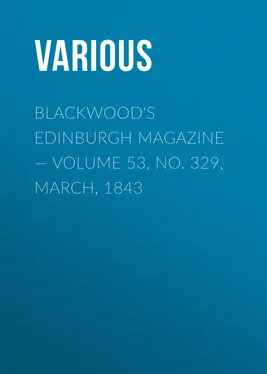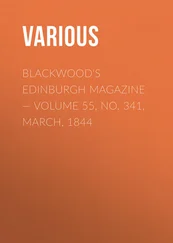Various - Blackwood's Edinburgh Magazine — Volume 53, No. 329, March, 1843
Здесь есть возможность читать онлайн «Various - Blackwood's Edinburgh Magazine — Volume 53, No. 329, March, 1843» — ознакомительный отрывок электронной книги совершенно бесплатно, а после прочтения отрывка купить полную версию. В некоторых случаях можно слушать аудио, скачать через торрент в формате fb2 и присутствует краткое содержание. Издательство: Иностранный паблик, Жанр: foreign_antique, periodic, foreign_edu, на английском языке. Описание произведения, (предисловие) а так же отзывы посетителей доступны на портале библиотеки ЛибКат.
- Название:Blackwood's Edinburgh Magazine — Volume 53, No. 329, March, 1843
- Автор:
- Издательство:Иностранный паблик
- Жанр:
- Год:неизвестен
- ISBN:нет данных
- Рейтинг книги:3 / 5. Голосов: 1
-
Избранное:Добавить в избранное
- Отзывы:
-
Ваша оценка:
- 60
- 1
- 2
- 3
- 4
- 5
Blackwood's Edinburgh Magazine — Volume 53, No. 329, March, 1843: краткое содержание, описание и аннотация
Предлагаем к чтению аннотацию, описание, краткое содержание или предисловие (зависит от того, что написал сам автор книги «Blackwood's Edinburgh Magazine — Volume 53, No. 329, March, 1843»). Если вы не нашли необходимую информацию о книге — напишите в комментариях, мы постараемся отыскать её.
Blackwood's Edinburgh Magazine — Volume 53, No. 329, March, 1843 — читать онлайн ознакомительный отрывок
Ниже представлен текст книги, разбитый по страницам. Система сохранения места последней прочитанной страницы, позволяет с удобством читать онлайн бесплатно книгу «Blackwood's Edinburgh Magazine — Volume 53, No. 329, March, 1843», без необходимости каждый раз заново искать на чём Вы остановились. Поставьте закладку, и сможете в любой момент перейти на страницу, на которой закончили чтение.
Интервал:
Закладка:
"He comes, he comes!" was murmured through the crowd; all was in motion. The horsemen, who till now had been chattering with their acquaintance on foot, or disorderedly riding about the meadow, now leaped upon their steeds, and dashed forward to meet the cavalcade which was descending to the plain: it was Ammalát Bek, the nephew of the Shamkhál 17 17 The first Shamkháls were the kinsmen and representatives of the Khalifs of Damascus: the last Shamkhál died on his return from Russia, and with him finished this useless rank. His son, Suleiman Pacha, possessed his property as a private individual.
of Tarki, with his suite. He was habited in a black Persian cloak, edged with gold-lace, the hanging sleeves thrown back over his shoulders. A Turkish shawl was wound round his arkhaloúkh, which was made of flowered silk. Red shalwárs were lost in his yellow high-heeled riding-boots. His gun, dagger, and pistol, glittered with gold and silver arabesque work. The hilt of his sabre was enriched with gems. The Prince of Tarki was a tall, well-made youth, of frank countenance; black curls streamed behind his ears from under his cap—a slight mustache shaded his upper lip—his eyes glittered with a proud courtesy. He rode a bright bay steed, which fretted under his hand like a whirlwind. Contrary to custom, the horse's caparison was not the round Persian housing, embroidered all over with silk, but the light Circassian saddle, ornamented with silver on a black ground; and the stirrups were of the black steel of Kharamán, inlaid with gold. Twenty noúkers 18 18 The attendants of a Tartar noble, equivalent to the "henchman" of the ancient Highlanders. The noúker waits behind his lord at table, cuts up and presents the food.
on spirited horses, and dressed in cloaks glittering with lace, their caps cocked jauntily, and leaning affectedly on one side, pranced and sidled after him. The people respectfully stood up before their Bek, and bowed, pressing their right hand upon their right knee. A murmur of whispered approbation followed the young chief as he passed among the women. Arrived at the southern extremity of the ground, Ammalát stopped. The chief people, the old men leaning upon their sticks, and the elders of Bouináki, stood round in a circle to catch a kind word from the Bek; but Ammalát did not pay them any particular attention, and with cold politeness replied in monosyllables to the flatteries and obeisances of his inferiors. He waved his hand; this was the signal to commence the race.
Twenty of the most fiery horsemen dashed forward, without the slightest order or regularity, galloping onward and back again, placing themselves in all kinds of attitudes, and alternately passing each other. At one moment they jostled one another from the course, and at the same time held in their horses, then again they let them go at full gallop over the plain. After this, they each took slender sticks, called djigidís, and darted them as they rode, either in the charge or the pursuit, and again seizing them as they flew, or picking them up from the earth. Several tumbled from their saddles under the strong blows; and then resounded the loud laugh of the spectators, while loud applauses greeted the conqueror; sometimes the horses stumbled, and the riders were thrown over their heads, hurled off by a double force from the shortness of their stirrups. Then commenced the shooting. Ammalát Bek had remained a little apart, looking on with apparent pleasure. His noúkers, one after the other, had joined the crowd of djigíterers, so that, at last, only two were left by his side. For some time he was immovable, and followed with an indifferent gaze the imitation of an Asiatic combat; but by degrees his interest grew stronger. At first he watched the cavaliers with great attention, then he began to encourage them by his voice and gestures, he rose higher in his stirrups, and at last the warrior-blood boiled in his veins, when his favourite noúker could not hit a cap which he had thrown down before him. He snatched his gun from his attendants, and dashed forward like an arrow, winding among the sporters. "Make way—make way!" was heard around, and all, dispersing like a rain-cloud on either side, gave place to Ammalát Bek.
At the distance of a verst 19 19 3500 English feet—three quarters of a mile.
stood ten poles with caps hanging on them. Ammalát rode straight up to them, waved his gun round his head, and turned close round the pole; as he turned he stood up in his stirrups, turned back—bang!—the cap tumbled to the ground; without checking his speed he reloaded, the reins hanging on his horse's neck—knocked off another, then a third—and so on the whole ten. A murmur of applause arose on all sides; but Ammalát, without stopping, threw his gun into the hands of one of his noúkers, pulled out a pistol from his belt, and with the ball struck the shoe from the hind foot of his horse; the shoe flew off, and fell far behind him; he then again took his gun from his noúker, and ordered him to gallop on before him. Quicker than thought both darted forward. When half-way round the course, the noúker drew from his pocket a rouble, and threw it up in the air. Ammalát raised himself in the saddle, without waiting till it fell; but at the very instant his horse stumbled with all his four legs together, and striking the dust with his nostrils, rolled prostrate. All uttered a cry of terror; but the dexterous horseman, standing up in the stirrups, without losing his seat, or even leaning forward, as if he had been aware that he was going to fall, fired rapidly, and hitting the rouble with his ball, hurled it far among the people. The crowd shouted with delight—"Igeed, igeed! (bravo!) Alla valla-ha!" But Ammalát Bek, modestly retiring, dismounted from his steed, and throwing the reins to his djilladár, (groom,) ordered him immediately to have the horse shod. The race and the shooting was continued.
At this moment there rode up to Ammalát his emdjék, 20 20 Foster-brother; from the word "emdjek"—suckling. Among the tribes of the Caucasus, this relationship is held more sacred than that of nature. Every man would willingly die for his emdjek.
Saphir-Ali, the son of one of the poor beks of Bouináki, a young man of an agreeable exterior, and simple, cheerful character. He had grown up with Ammalát, and therefore treated him with great familiarity. He leaped from his horse, and nodding his head, exclaimed—"Noúker Mémet Rasoúl has knocked up the old cropped 21 21 This is a celebrated race of Persian horses, called Teke.
stallion, in trying to leap him over a ditch seven paces wide." "And did he leap it?" cried Ammalát impatiently. "Bring him instantly to me!" He went to meet the horse—and without putting his foot in the stirrup, leaped into the saddle, and galloped to the bed of a mountain-torrent. As he galloped, he pressed the horse with his knee, but the wearied animal, not trusting to his strength, bolted aside on the very brink, and Ammalát was obliged to make another turn. The second time, the steed, stimulated by the whip, reared up on his hind-legs in order to leap the ditch, but he hesitated, grew restive, and resisted with his fore-feet. Ammalát grew angry. In vain did Saphir-Ali entreat him not to force the horse, which had lost in many a combat and journey the elasticity of his limbs. Ammalát would not listen to any thing; but urging him with a cry, and striking him with his drawn sabre for the third time, he galloped him at the ravine; and when, for the third time, the old horse stopped short in his stride, not daring to leap, he struck him so violently on the head with the hilt of his sabre, that he fell lifeless on the earth.
"This is the reward of faithful service!" said Saphir-Ali, compassionately, as he gazed on the lifeless steed.
Читать дальшеИнтервал:
Закладка:
Похожие книги на «Blackwood's Edinburgh Magazine — Volume 53, No. 329, March, 1843»
Представляем Вашему вниманию похожие книги на «Blackwood's Edinburgh Magazine — Volume 53, No. 329, March, 1843» списком для выбора. Мы отобрали схожую по названию и смыслу литературу в надежде предоставить читателям больше вариантов отыскать новые, интересные, ещё непрочитанные произведения.
Обсуждение, отзывы о книге «Blackwood's Edinburgh Magazine — Volume 53, No. 329, March, 1843» и просто собственные мнения читателей. Оставьте ваши комментарии, напишите, что Вы думаете о произведении, его смысле или главных героях. Укажите что конкретно понравилось, а что нет, и почему Вы так считаете.












